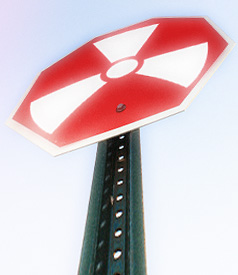Truthout is a vital news source and a living history of political struggle. If you think our work is valuable, support us with a donation of any size.
Weeks after the signing of the cautious US-Russia START Treaty, the antinuclear movement has ratcheted up efforts to push for more rigorous steps toward a nuclear-free world.
On the eve of next week’s Nuclear Non-Proliferation Treaty (NPT) review conference, 1,000 leading peace, justice and environmental activists and scholars from communities across the United States and more than 20 nations will gather for an international conference on April 30 and May 1 in New York City. UN Secretary General Ban Ki-moon will be among the participants.
Post conference, the network will hold a rally and march in Manhattan, and will then present millions of petition signatures to the NPT Review Conference, urging it to begin negotiations as soon as possible to eliminate the world’s nuclear arsenals.
The conference has been organized by a network of 25 leading popular peace and nuclear weapons abolition organizations in the US, Europe, Japan and Israel. These activists seek a broader, more comprehensive, more effective nuclear strategy that goes far beyond President Obama’s efforts to date.
“We need more than limited arms control agreements that do not adequately address the dangers of nuclear catastrophes posed by the nuclear powers,” said Judith LeBlanc, a field organizer for Peace Action, speaking about the network’s goals. “We are urging that the critically important Review Conference conclude with a commitment to begin negotiations on a treaty to completely eliminate all nuclear weapons, as provided for by the Non-Proliferation Treaty.”
The United States and Russia hold the majority of the world’s nuclear weapons. Under the new START Treaty, the US and Russia will be limited to significantly fewer strategic arms within seven years from the date the treaty enters into force. Each party has the flexibility to determine for itself the structure of its strategic forces within the aggregate limits of the treaty.
The treaty combines elements of the 1991 START Treaty with new elements tailored to the limitations of the treaty. Measures under the treaty include on-site inspections and exhibitions, data exchanges and notifications related to strategic offensive arms and facilities covered by the treaty, and provisions to facilitate the use of national technical means for treaty monitoring.
The US Senate and the Russian legislature must approve the treaty before it can enter into force. Also, the treaty does not contain any constraints on testing, development or deployment of current or planned US missile defense programs or current or planned United States long-range conventional strike capabilities.
LeBlanc said the new START Treaty is a small step in the right direction, but that Obama must take a much larger step: beginning negotiations to get rid of all nuclear weapons.
Also, LeBlanc said it’s time for a grassroots movement to organize to strategize on how to forcefully demand elimination of nuclear weapons.
She said she knows the treaty will have a rough road in the Senate and that the grassroots movement needs to “break the logjam.”
In addition, LeBlanc said that when conference participants get together, it will send a signal to the United Nations that they would like to completely eliminate all nuclear weapons.
Joseph Gerson, disarmament director for the American Friends Service Committee, said, “Secretary General Ban Ki-moon’s decision to join us is signaling the critical importance of popular action to move governments to do what they must do: to abolish nuclear weapons.” He continued, “Even when and if the recently negotiated New START Treaty is ratified and implemented, the US and Russia will have more than 3,000 thermonuclear warheads with the destructive capability of roughly 60,000 Hiroshima A-Bombs on hair trigger alert.”
Article VI of the Non-Proliferation Treaty, which went into effect in 1970, requires the five original nuclear powers to begin “good faith negotiations” for the complete elimination of their nuclear arsenals. Such negotiations have never been initiated. Nuclear-armed states India, Israel and Pakistan remain outside the treaty.
“In addition to the immediate dangers posed by the world’s nuclear weapons, the hypocritical refusal by the United States and other nuclear powers to fulfill their part of the NPT bargain, jeopardizes the treaty as a whole,” said Jackie Cabasso, executive director of the Western States Legal Foundation. “It encourages the nuclear weapons proliferation President Obama says he is working to prevent.”
A terrifying moment. We appeal for your support.
In the last weeks, we have witnessed an authoritarian assault on communities in Minnesota and across the nation.
The need for truthful, grassroots reporting is urgent at this cataclysmic historical moment. Yet, Trump-aligned billionaires and other allies have taken over many legacy media outlets — the culmination of a decades-long campaign to place control of the narrative into the hands of the political right.
We refuse to let Trump’s blatant propaganda machine go unchecked. Untethered to corporate ownership or advertisers, Truthout remains fearless in our reporting and our determination to use journalism as a tool for justice.
But we need your help just to fund our basic expenses. Over 80 percent of Truthout’s funding comes from small individual donations from our community of readers, and over a third of our total budget is supported by recurring monthly donors.
Truthout has launched a fundraiser to add 379 new monthly donors in the next 6 days. Whether you can make a small monthly donation or a larger one-time gift, Truthout only works with your support.
